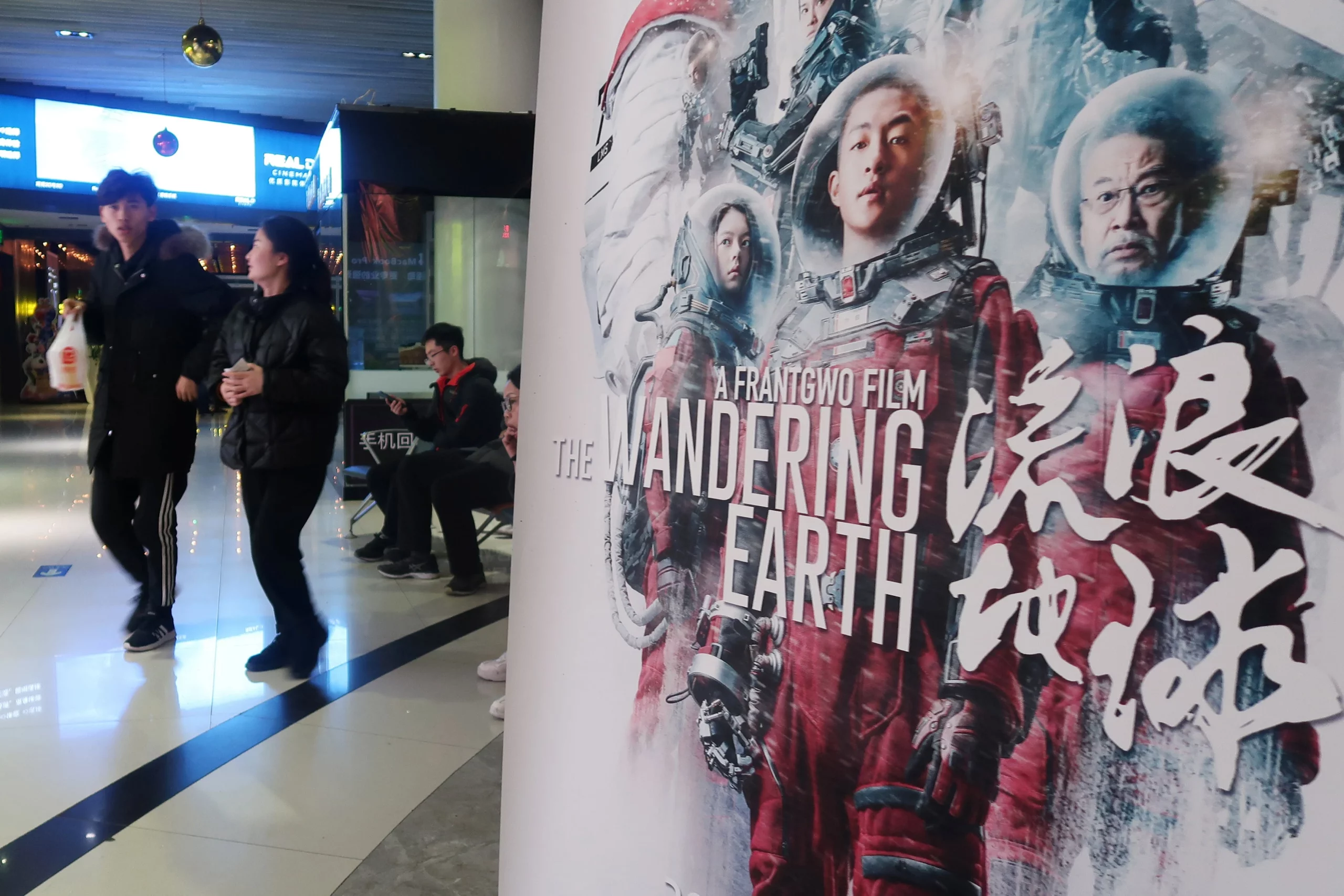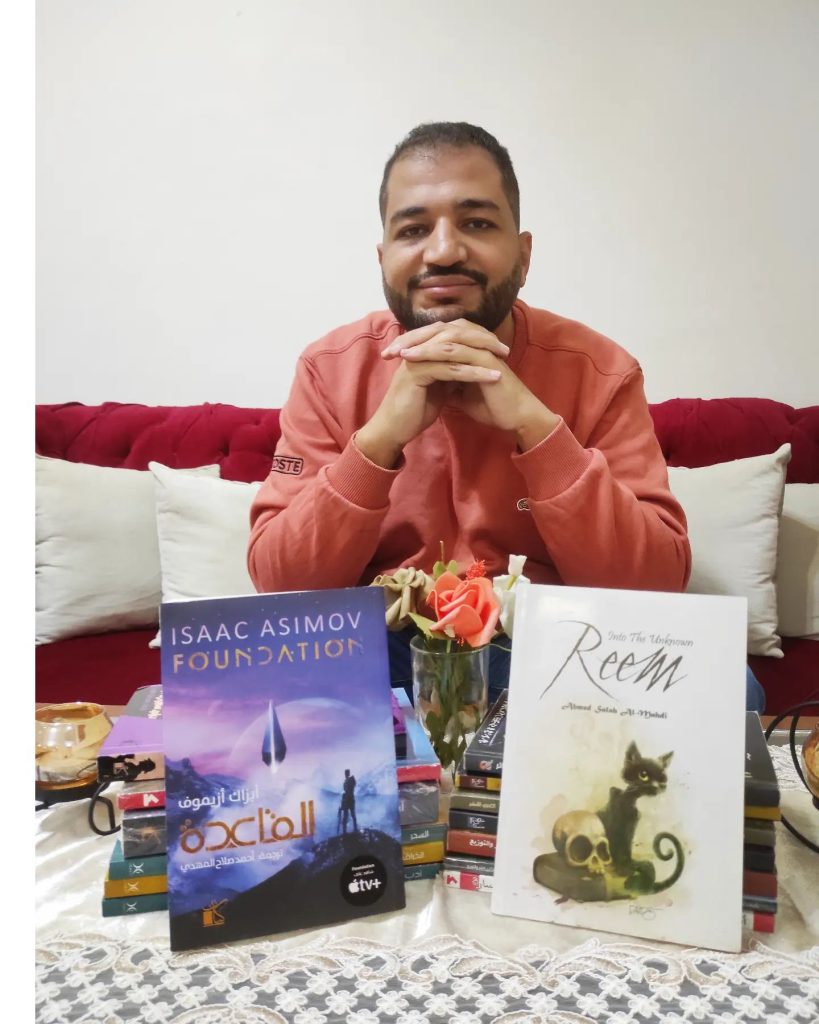
An exclusive interview of Ahmed Salah Al-Mahdi, an Egyptian YA sci-fi and fantasy author, literary translator and graphic artist, and member of the ever illustrious Egyptian Society for Science Fiction (ESSF) and a contributor to ‘Arab and Muslims Science Fiction: Critical Essays’ (McFarland, 2022).
By Emad Aysha
Ahmed has recently been translating several short stories by Iranian author Iraj Fazel Bakhsheshi from English into Arabic. In exchange for this help, Mr Iraj has been getting some of Ahmed’s stories translated into Farsi. Something that has grown out of this comparison of notes between two powerhouses of science fiction in the Middle East is a new short story by Ahmed, “The Religion Engineer”. A galactic engineer working for the emperor of the galaxy wants permission to put an end to the dream of intelligent life on a particular planet, the third from the sun in a minor solar system, because his calculations predict that the sentient species from this world will be xenophobic and bigoted and declare war on other intelligence. He wants a meteorite directed at this pesky little planet to nip this potential threat in the bud. This story and plot reminded me of a story I’d read, so this ‘demanded’ an interview!
Dear Ahmed, first off, I loved your story. The opening scene, where the engineer looks at the galaxy like a pair of disembodied eyes, is excellent. And the incredible palace he enters to meet the emperor. Its’ both fantasy in its epic style and hard sci-fi in its content.
Please tell me which story by Mr Iraj influenced you. And please tell me what you think of his writing in general.
I was inspired by the story “The Beginning of Life”, where some researchers are working on terraforming a planet by altering its atmosphere and starting a process to create life using cosmic physics. This story has an impact event like mine, but it was not calculated, and the engineers ended up stranded on the planet to be our ancestors.
In my story, the impact was calculated to eliminate a sentient lifeform that will wreak havoc on the galaxy. So the two stories are similar in some aspects but different in others.
I liked his stories, and I enjoyed translating them. He seemed like a man who is concerned about our planet and its inhabitants, humans and otherwise. His stories also reflect his concern with the past and the future of our kind.
I liked that some of his stories are inspired by his Persian culture, like “Yalda”, which gives new meaning to the ancient festival. This kinds of stories pumps new blood in the science fiction genre.
Which examples of Western SF influenced you as well? It felt like a cross between Isaac Asimov’s Foundation novels – with the predictive mathematical science of psychohistory – and your translation of Lord Dunsany’s The Gods of Pegāna.
I was inspired by Asimov’s Foundation and have always dreamt about creating my own Galactic Empire, and I’m still working on some drafts for a future novel. But I also wanted to try this theme in this short story.
I was also inspired by Dune Messiah, where the Tleilaxuise worked on merging religion with government. This particular quote, “Tell him the Tleilaxu have a department of religious engineering, shaping religions to particular needs,” was the first spark that made me think about writing the story.
You’ve successfully translated Asimov’s first Foundation novel. You’re also a big, big fan of the original novella of The Wandering Earth. If that Chinese work was in English, or you spoke Chinese, would you translate it to Arabic too?
I loved translating Foundation so much, and I’d love to translate The Wandering Earth. Unfortunately, I don’t speak Chinese; I read the story translated into English, so I won’t be able to translate it directly from Chinese. But if there is a publisher willing to translate the story from the English version I’d be glad to do it.
Please tell me what you like so much about Wandering Earth. How is the novella better and different from the movie?
I watched the movie; it’s a pretty good one. But I loved the novella more; it’s not about action or escaping the clutches of Jupiter. It’s a philosophical tale about the protagonist’s life, born at the end of The Age of Barking, just as the Earth’s rotation was coming to a halt. For him, the spinning earth is something of the past. Even something simple like the rising of the sun is a great event for him, which was done by riding a boat fast across the sea toward the sun. He delves deeper into the psyche of humans. The conflict between the Takers, Leavers, and many other aspects was not mentioned in the movie.
The movie was thrilling, but the novella filled me with wonder and awe. Liu Cixin’s imagination is incredible, as also his ability to move the emotion of the readers. I was also impressed by the scientific details of the book.

BEHIND THE HEADLINES: Ahmed Salah Al-Mahdi with his translation of Asimov’s ‘Foundation’ and his own novel (now in English) ‘Reem’. What lies next, I wonder? [Photo credit: provided by interviewee]
What impressed me – I only watched the movie – was the sacredness of the family and the message of hope. What about you? And is there anything we can relate to specifically as Arabs?
The story mentions his grandfather, who passed away before departure, and his father, who serves as an astronaut in the air force. They spend time together and go on trips but are not firmly attached. In this age, emotions are something of the past; even the protagonist said: "It was incomprehensible to us why people in the Ante-solar Era invested so much emotion into matters that had nothing to do with survival." He didn't even bother when his father left them to spend two months with another woman before returning. This is because they live a harsh life, and every day they feel like they might not survive. They might be too late, so there is no room to feel attached to something earthly.
There is also an underlining theme about destiny, revolution, and the dream to change the shape of the world. I think Arabs and Muslims faced many crises and revolutions and saw many regimes rise and fall, so maybe we can learn hope from the book and movie.
And with The Wandering Earth 2 being released on 22nd January, I’m looking forward to seeing how much more they adopted from the novella and how much they changed.
Finally, would you like more cooperation between authors, translators and publishers between countries like Egypt and Iran and Egypt and China? How would this benefit us all and the genre?
I have translated the stories of many authors from around the world; my stories were translated into so many languages, and I love that so much. As an author, I’d like to broaden the scope of my audience. And as a translator, I want to present different cultures to the Arabic reader. This will be culturally beneficial for everyone involved, and I’d look forward to seeing my stories and novels translated into Chinese and other major languages.






